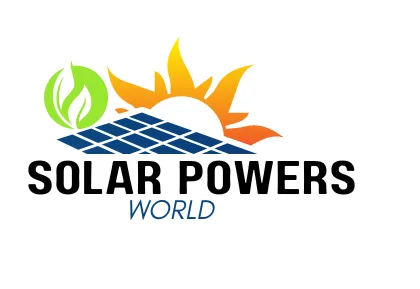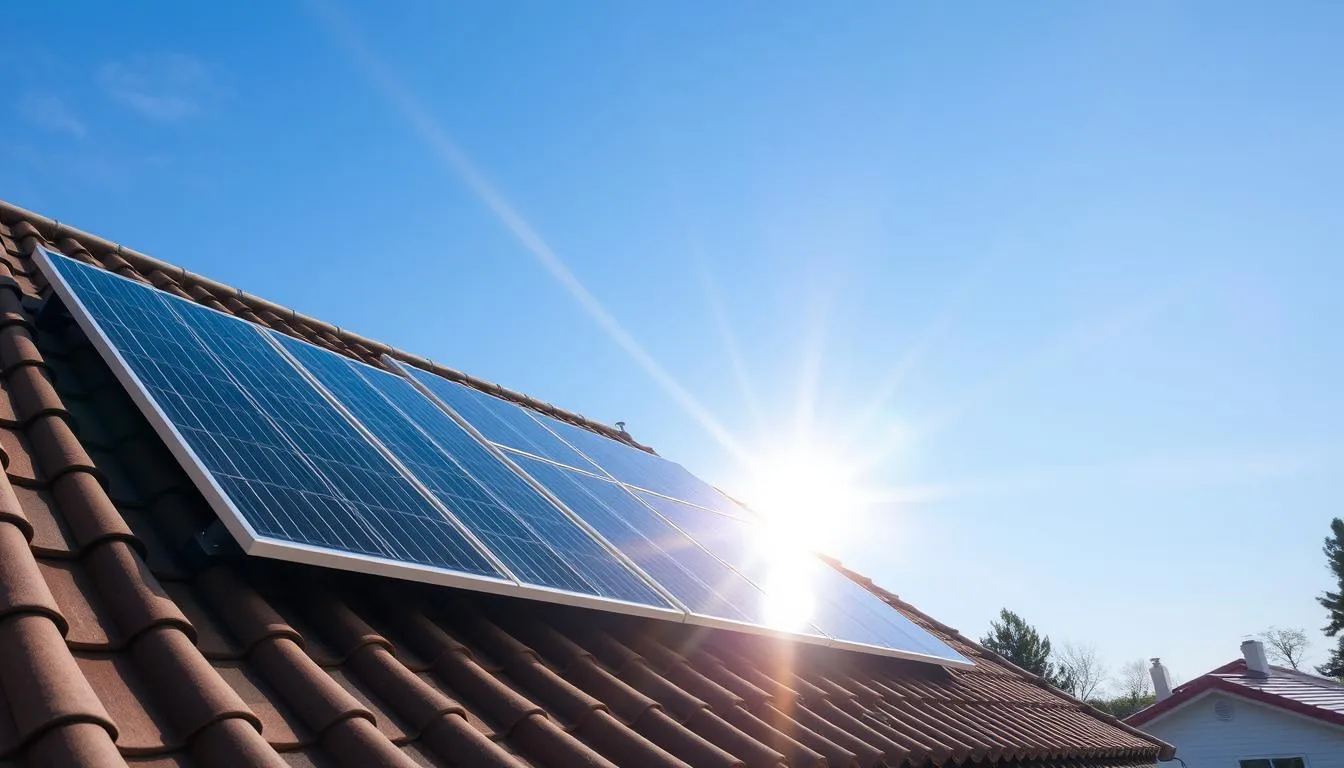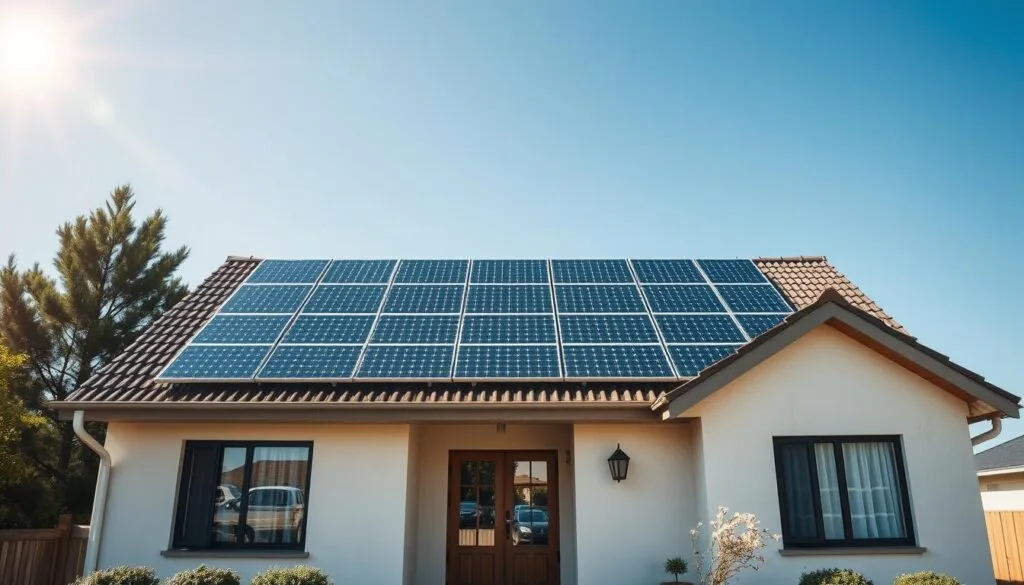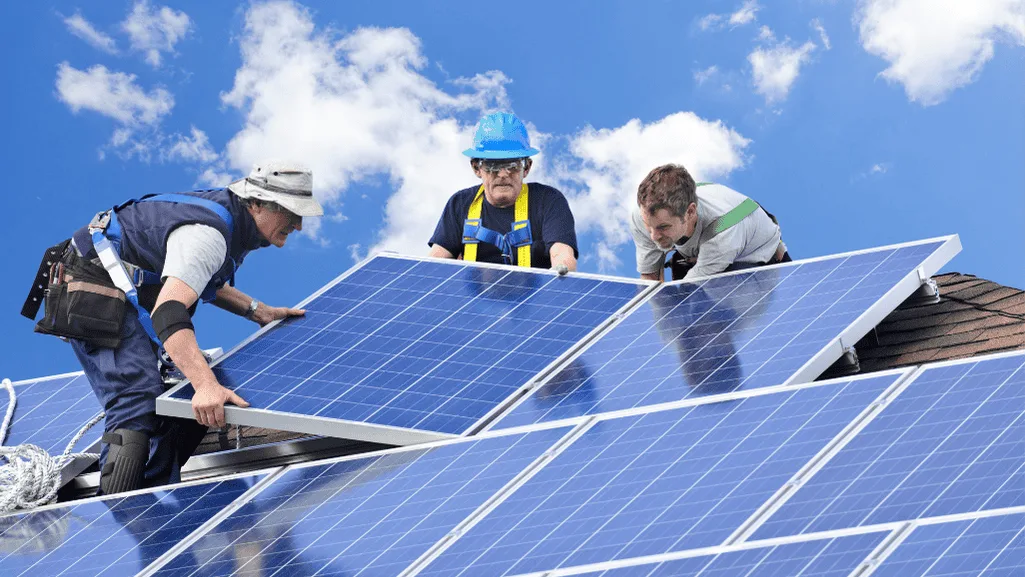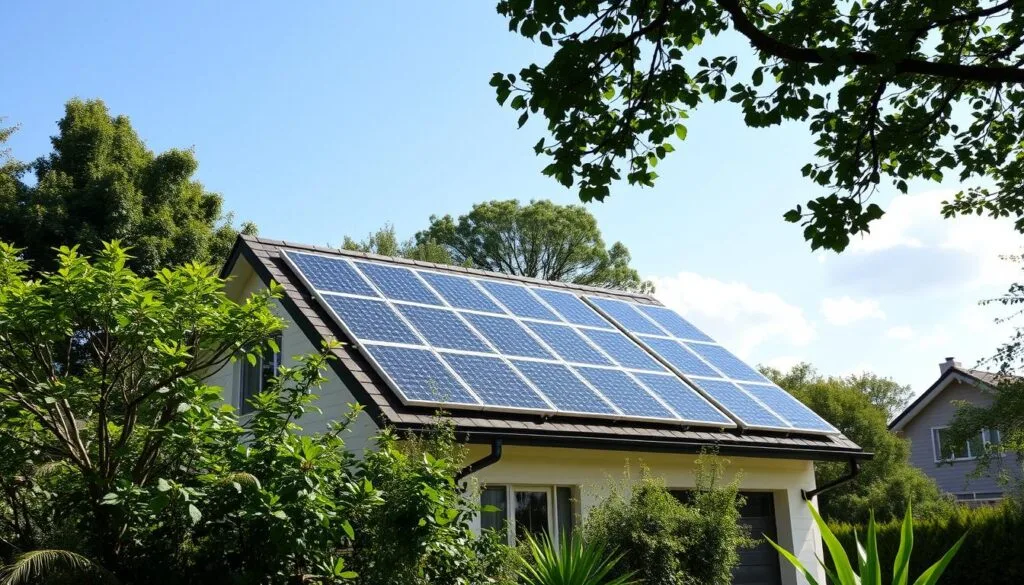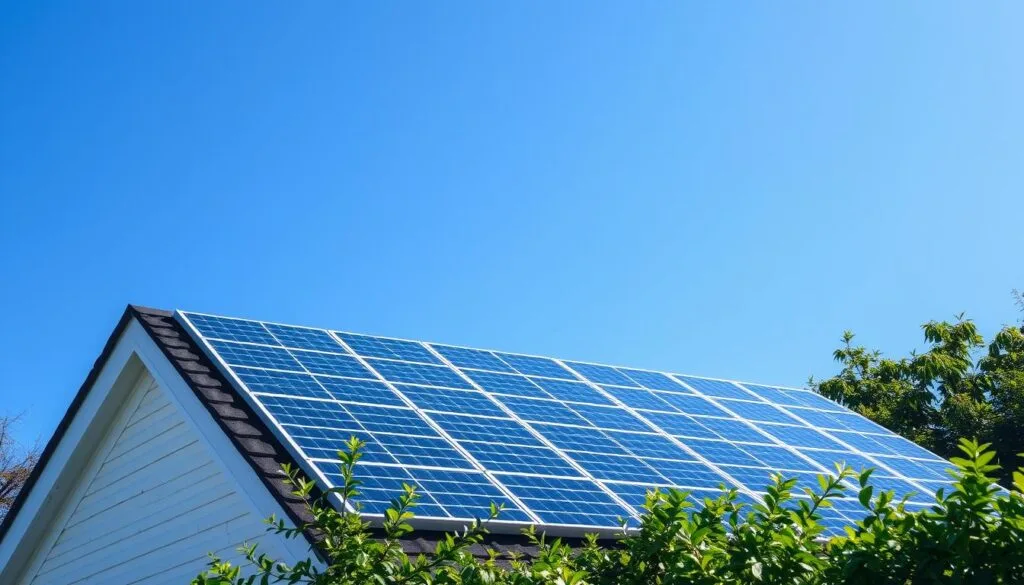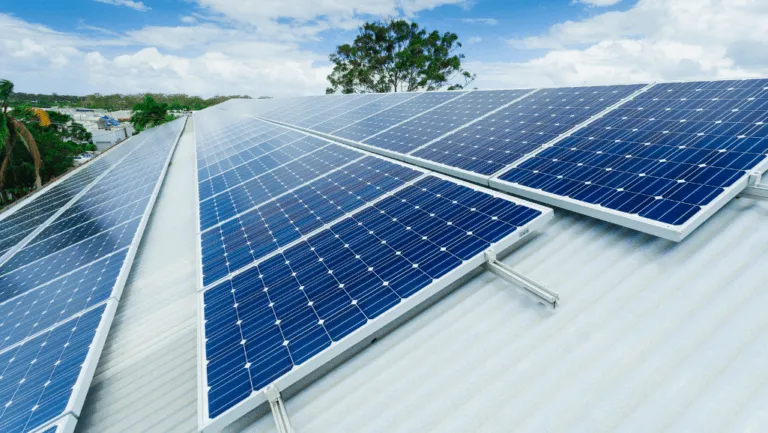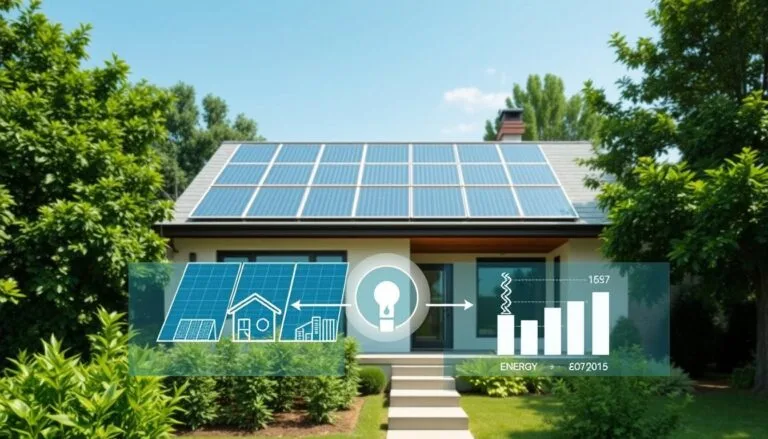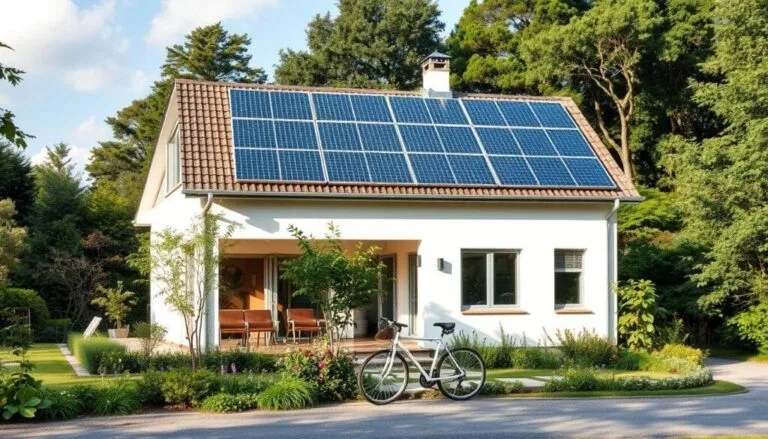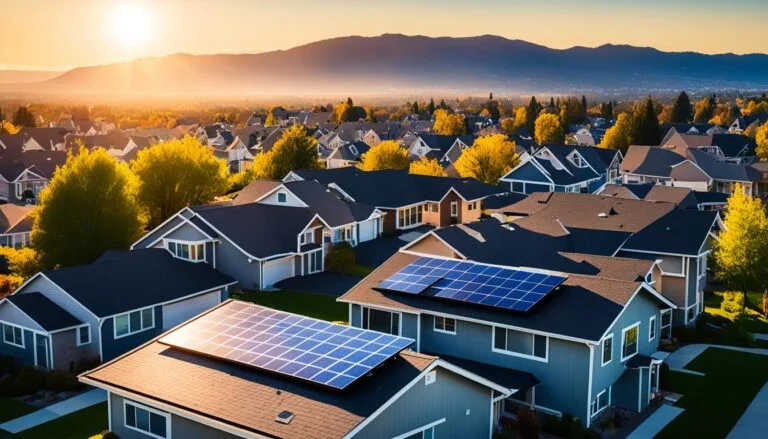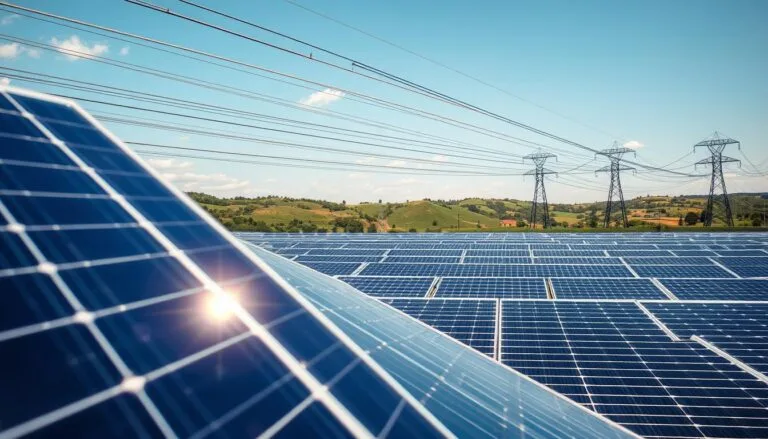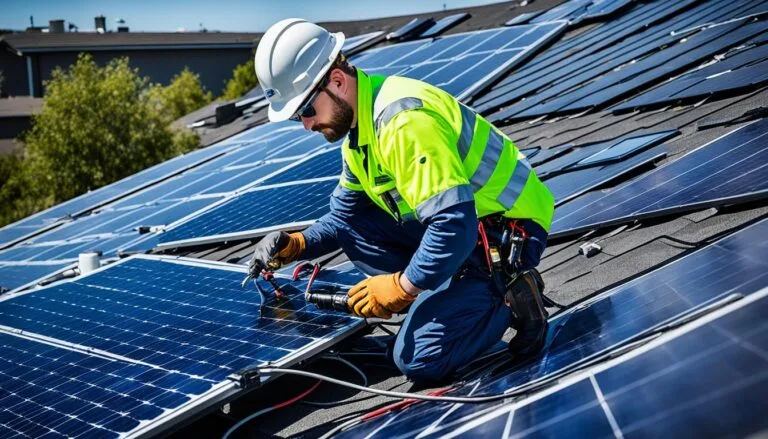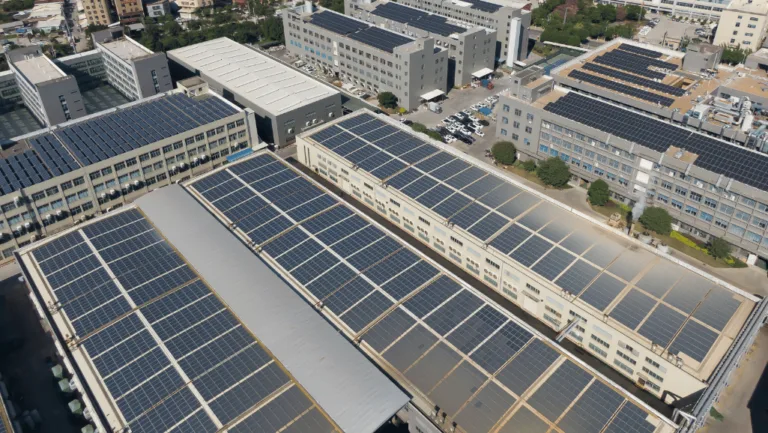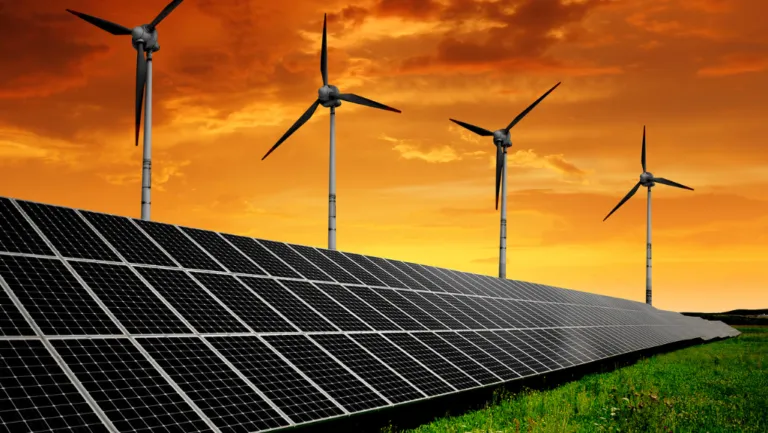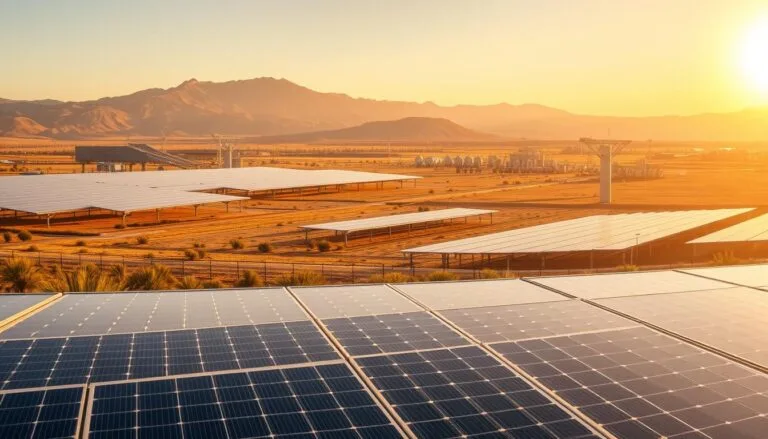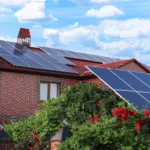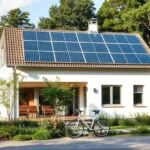Homeowners in America are now turning to cost-effective solar solutions to lower their bills. With residential solar panels, families live greener and save money over time. Solar installation services are easier to get and make switching to green energy smooth.
Using the sun’s power, home solar systems offer a great way to secure lower electricity rates. Homeowners can protect themselves from the ups and downs of energy prices. With better technology and more financial help, like federal tax credits, going green is smart for both the planet and wallets.
Many things affect how much you save with, like local energy prices and system size. But, the chance for big savings is always there.
Key Takeaways
- Home solar systems save about $1,530 a year, paying off in about 9 years.
- A 30% federal tax credit helps lower the cost of solar panels.
- Local incentives and rebates make solar panels cheaper upfront.
- Tools like the PVWatts Calculator by NREL help figure out solar savings.
- Solar panels are becoming more popular as they cut long-term energy bills.
- With net metering and solar batteries, savings stay steady even with price changes.
The Fundamentals of Simple Home Savings Solar
Using solar energy at home brings big economic and environmental wins. These systems are key to making homes more sustainable. They boost solar panel efficiency and cut down on non-renewable energy use. Knowing how solar power works is key for homeowners looking into solar panel setup.
Understanding Solar Energy Basics
Solar energy uses PV cells to turn sunlight into electricity. This is vital for better home energy systems. The amount of electricity made depends on how well the panels work. Where you put the panels and how much sunlight they get are very important for their performance.
Components of a Residential Solar System
- Solar Panels: Capture sunlight and convert it into DC power.
- Inverter: Converts DC into AC power suitable for home use.
- Mounting Hardware: Secures solar panels on roofs or ground frames.
- Solar Battery Storage (optional): Stores excess energy for later use.
These solar energy components are key for a working solar system at home. Knowing what each part does helps homeowners make smart choices about their solar setup.
The Role of Solar in Home Energy Efficiency
Adding solar energy to your home is a big step towards using less energy. A good solar system cuts down on bills and can even increase your home’s value. Homes with solar setups see lower electricity costs and can make money by selling extra power back to the grid.
| Home Size (sq. ft.) | Number of Solar Panels Needed |
|---|---|
| 1,500 | 18-24 |
| 2,000 | 24-32 |
| 2,500 | 30-40 |
This info shows how eco-friendly solar options can be used in different sized homes. It highlights how solar power can meet various energy needs. By using solar tech, homeowners are helping create a future that’s sustainable and energy-free.
Assessing Your Home’s Solar Potential
Unlocking your home’s solar system potential means looking at several key factors. You need to think about your property’s unique features and the environment around it. This ensures you get the most out of sunshine efficiency and optimal solar placement.
First, check your roof’s condition and how it faces the sun. How much sunlight your roof gets affects how well solar panels work. Also, the weather in your area is important for using solar energy.
It’s also key to know the different ways you can go solar. For example, you might join a solarize program. This lets a group buy solar systems together, lowering costs for everyone. It makes using solar power more affordable for your community.
Here are some steps to see if your home is good for solar:
- Do a home energy audit to find where energy is lost and how to improve.
- Look into any rules in your neighborhood or homeowners association about solar panels.
- Think about how big and powerful the solar system should be to meet your energy needs.
- Check out different payment options like leasing, loans, or Power Purchase Agreements (PPAs).
Looking at these things will help you understand the costs and savings. This makes it easier to decide if solar is right for you.
| Option | Initial Cost | Maintenance | Estimated Savings |
|---|---|---|---|
| Full Ownership | Higher Initial Cost | Owner’s Responsibility | Higher Long-term Savings |
| Leasing | Low/No Upfront Cost | Covered by Lessor | Fixed Monthly Savings |
| Solarize Program | Reduced Rate through Group Buying | Varies by Provider | Community-negotiated Savings |
| PPA | No Upfront Cost | Covered by Provider | Dependent on Usage |
By looking at these options and considering things like HOA rules and the weather, you can see how well your home can use solar power. This helps you find a green energy solution that saves money and uses sunshine efficiently.
Comparing Solar Installation Services
Finding the right solar provider is key to getting a good deal now and reliable energy later. This part talks about what to look for, including costs and service quality from top solar companies.
Evaluating Solar Providers
When looking for solar installers, check their reputation, experience, and the quality of parts they use. Good solar setup means more than just putting panels up. It means ongoing service and dependable energy systems. Look for companies that share their performance data and customer feedback. This shows their quality and reliability.
Analyzing Cost-Efficiency of Solar Solutions
High-quality solar systems don’t have to be expensive. The federal solar tax credit and state incentives can lower costs. The panels’ quality and your home’s energy needs also play a part in cost efficiency. Even though a good solar setup might cost a lot at first, you can save money over time with incentives and savings.
Seeking Quality and Reliability in Solar Installations
Choosing the right solar panels and installation methods is crucial for reliable energy. A company that values quality and uses the latest technology will give you a system that lasts and works well. Top brands that innovate are often behind the best installers, ensuring your investment pays off with savings.
Adding solar energy to your home is a big step. It’s about making a smart choice that fits your budget and values the planet. As solar tech gets better and more common, it’s important to check out solar providers carefully to get the most from your investment.
Financial Benefits of Residential Solar Panels
Going solar is a smart move for homeowners. It’s not just good for the planet, but also for your wallet. Thanks to the federal solar tax credit, state rebates, and local incentives, solar energy is more affordable.
Focusing on the economic advantages offered, the ITC benefits have motivated numerous homeowners across the nation to invest in solar technology.
Understanding the Federal Solar Investment Tax Credit (ITC)
The federal solar tax credit, or ITC, lets homeowners deduct 30% of solar system costs from their taxes. This makes solar more affordable and encourages more people to switch to renewable energy. After January 1, 2033, the tax credit will drop to 26%, so investing in solar now is a smart choice.
Exploring State Incentives and Rebates for Solar Adoption
States also offer their own solar incentives and rebates. These can include sales tax exemptions, property tax exclusions, cash rebates, and support for community solar projects. These incentives make solar power a smart financial move, not just an environmental one.
With federal, state, and local incentives, the upfront costs of solar systems go down. Homeowners can even make money by selling extra electricity back to the grid in many states. This turns an eco-friendly choice into a steady source of income.
Simple Home Savings Solar: Initiating Eco-Friendly Solar Options
Exploring residential solar energy is more than saving on bills. It’s a big step towards lessening the environmental impact of solar. Solar power uses clean energy, cutting down on greenhouse gases. This helps make our planet healthier. By choosing eco-friendly solar installation, homeowners help the planet and save money.
Solar power has been around for over 50 years and keeps getting better. It offers energy freedom with strong systems that can power whole homes. Solar energy is a smart choice for saving money and protecting the environment. It’s a lasting investment in a greener future.
| Key Solar Power Benefit | Details |
|---|---|
| Investment Return | Solar panels cut costs and boost home value, saving homeowners between $25,500 and $33 over time. |
| Installation Expertise | Companies like All Energy Solar, with over a decade of experience, ensure top-notch eco-friendly solar installation following NABCEP standards. |
| Federal Incentives | Homeowners get a 30% tax credit, lowering the cost of solar panels. |
| Operational Efficiency | Solar systems work well on cloudy days, providing steady energy all year. |
Understanding the costs of solar energy is key to getting the most out of it. Options like long-term loans with prepayment options make solar more affordable. Homeowners should check out resources like the Database for State Incentives for Renewables & Efficiency (DSIRE) for local incentives to lower solar costs.
Choosing residential solar energy is a big step towards saving money and protecting the environment. It’s a smart move for those looking to make a positive change. Knowing about solar incentives, professional installations, and long-term savings helps homeowners create a green and cost-effective home.
How to Reduce Energy Bills with Solar Power
The use of efficient solar technology is changing how we handle our energy bills. With solar energy savings, homeowners can cut their energy costs by a lot. This also makes their homes more energy efficient.
Switching to solar power can greatly reduce energy costs. By making their own electricity, homeowners use less power from the grid. This can lead to lower monthly bills. For example, the average cost of electricity is $0.17 per kWh. Solar panels could cut this to $0.08 per kWh with a 30% tax credit.
Solar installations offer long-term savings. Homeowners can save up to 62% on their electric bills. This means saving $760-$886 a year by sending extra power back to the grid. Over 20 years, this could save about $20,876, showing solar power is a smart choice.
Investing in solar is not just about saving money now. It also helps with future costs as rates change. Smart energy use can cut bills from $1,200 a year to $200-$400.
- Solar panels are a lasting investment, paying off in 8 to 9 years.
- After paying off, homeowners get free electricity and can make money from extra energy.
- With rising utility costs, the savings from solar panels grow too.
As solar grants and subsidies become easier to get, more people are choosing renewable energy. These incentives help cover the cost and encourage using efficient solar technology.
In summary, the benefits of solar energy savings to lower electric bills are clear. As costs go down and policies support it, more homeowners will switch to solar. This will lead to a greener and more sustainable energy future.
Maximizing Home Energy Efficiency Through Solar
Using solar conservation methods and energy management is key to sustainable living. Adding smart home technology boosts your home’s efficiency and functionality.
Strategies for Energy Conservation with Solar Technology
Putting solar panels in the right spot is crucial for their best performance. By focusing on solar utility benefits, homeowners can increase energy production. Regular checks make sure everything works well.
Using tech like solar tracking systems and high-efficiency inverters helps a lot. These integrated solar solutions make your solar setup more powerful. For more tips on improving your solar system, check out Maximize Your Solar System’s Energy Efficiency.
Pairing Solar with Smart Home Upgrades
Linking solar power with smart home technology gives you total control over energy use. Smart thermostats and energy-saving lights work with solar panels to use energy better. This not only saves money but also helps the environment.
For more info on how to use these together for better energy management, see Solar Incentives.
These solar conservation methods and smart home upgrades lead to lower costs and less carbon emissions. They’re a big step towards a cleaner planet.
Exploring Sustainable Home Improvements with Solar
Adding solar technology to homes is a big step towards a greener future. Homeowners choosing green building design are getting ready for renewable energy and changing the look of homes. They pick solar panels for many reasons, like saving money and living more eco-consciously. Solar panels have dropped in price by over 50% in ten years, making them more affordable as a renewable energy investment.
Integrating Solar Panels with Eco-Friendly Home Design
Sustainable architecture includes adding solar panels that look good and save energy. The average cost for solar panels is about $16,000, but it can go down to $11,200 with a 30% tax credit. There are many ways to pay for them, like cash, loans, leases, and PPAs. Solar panels can also increase a home’s value by 3-4%. This makes them a smart choice for homeowners looking at green building design.
Long-Term Environmental Advantages of Solar Energy
Solar panels do more than just help individual homes. They reduce global carbon emissions and move us away from fossil fuels. Over 25 to 30 years, solar panels can make a 20% or more return on investment. They also save homeowners about $19,200, or $100 a month on electricity bills.
This shows the environmental benefits of solar. It also means saving on electricity costs and protecting against price increases. Installing solar panels is a way to show commitment to renewable energy. It helps reduce our reliance on non-renewable sources and keeps our planet healthy for the future.

